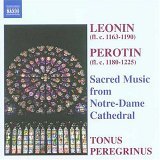Leonin
 From Conservapedia
From Conservapedia Leonin, along with his student Perotin is one of the earliest composers known to us by name.
Very little is known about the life of Leonin, except that he was born in Paris in 1135 and died in approximately 1201. He received his training at the Notre Dame Cathedral school in Paris and later became a priest at Notre Dame. The writings of Anonymous IV, an English theorist who worked in the late 13th century, are the only source of information about the composer.
For most of his life, he worked in a church called "Beatae Mariae Virginis" and very likely worked as a choirmaster in the completed Notre Dame cathedral in Paris. He is especially known for his development and original writing of polyphonic music (music that has two or more lines occurring at the same time), in a style known as Ars Antiqua (the ancient art).
Leonin's compositions were based on the Gregorian chants. The original chant served as the foundation or cantus firmus and a second voice, called the descant, was added to the original chant. This style came to be known as organum. One of Leonin's major contributions to music was a collection of organum with two-part settings of portions of the mass known as the Magnus Liber Organi, of which three are the most well-known:
- Alleluia Pascha nostrum
- Haec dies quam fecit Dominus
- Viderunt Omnes
Links[edit]
http://www.hypermusic.ca/comp/leonin.html http://stevenestrella.com/composers/index.html?composerfiles/leonin1201.html
Categories: [Composers]
↧ Download as ZWI file | Last modified: 03/14/2023 22:29:35 | 54 views
☰ Source: https://www.conservapedia.com/Leonin | License: CC BY-SA 3.0
 ZWI signed:
ZWI signed:
 KSF
KSF